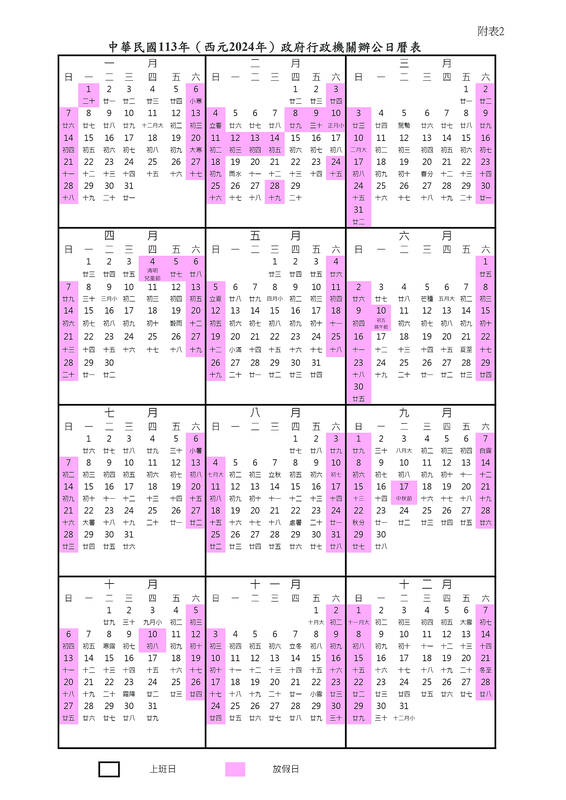The Executive Yuan (EY) yesterday announced the official workday calendar for next year, which includes one makeup day and four holidays with more than three days off.
It also announced new standards for makeup days in the event of consecutive holidays.
The Directorate-General of Personnel Administration cited the importance of the Lunar New Year and Tomb Sweeping holidays to the public as its reason to mandate flexible off-days.

Photo courtesy of the Directorate-General of Personnel Administration
The 115 total off-days dovetail with dates that international financial markets are closed, minimizing the effects of state holidays on stock and currency exchange trading, it said.
Over the next five years, only the calendar for 2026 has not been adjusted, while the other four years would only have one makeup day to account for the holiday on the day before Lunar New Year’s Eve.
The changes came after six makeup days were mandated by the government this year, which drew criticism from the public.
Regarding when the makeup workday should be, the phrasing has been amended to “the Saturday on the week, or the Saturday the week after,” from “the Saturday the week before.”
Next year’s makeup day has been set for Feb. 17, compensating for the Thursday before Lunar New Year’s Eve.
The official workday calendar only applied to civil servants, public officials and employees at state-owned companies, adding that the off-days of military personnel falls under the jurisdiction of the Ministry of National Defense, the agency said.
Schools should observe the academic calendar, which is decided by the Ministry of Education, while the private sector should base off-days on the Labor Standards Act (勞動基準法), it said.
Regarding whether the reduced off-days would affect domestic markets, Minister of Economic Affairs Wang Mei-hua (王美花) said that the overall number of off-days remains unchanged, and the domestic market would not be affected.
The Ministry of Economic Affairs’ post-pandemic regulations target the service industry and shopping districts to improve service quality, Wang said.
Total retail revenue last month increased to NT$369.7 billion (US$12.0 billion), or annual growth of 7.5 percent, and restaurants had revenue of NT$81.5 billion — an annual increase of 31.4 percent, Wang said, adding that the public should have more faith in the domestic market.
Additional reporting by Chung Li-hua

Taiwan is projected to lose a working-age population of about 6.67 million people in two waves of retirement in the coming years, as the nation confronts accelerating demographic decline and a shortage of younger workers to take their place, the Ministry of the Interior said. Taiwan experienced its largest baby boom between 1958 and 1966, when the population grew by 3.78 million, followed by a second surge of 2.89 million between 1976 and 1982, ministry data showed. In 2023, the first of those baby boom generations — those born in the late 1950s and early 1960s — began to enter retirement, triggering

ECONOMIC BOOST: Should the more than 23 million people eligible for the NT$10,000 handouts spend them the same way as in 2023, GDP could rise 0.5 percent, an official said Universal cash handouts of NT$10,000 (US$330) are to be disbursed late next month at the earliest — including to permanent residents and foreign residents married to Taiwanese — pending legislative approval, the Ministry of Finance said yesterday. The Executive Yuan yesterday approved the Special Act for Strengthening Economic, Social and National Security Resilience in Response to International Circumstances (因應國際情勢強化經濟社會及民生國安韌性特別條例). The NT$550 billion special budget includes NT$236 billion for the cash handouts, plus an additional NT$20 billion set aside as reserve funds, expected to be used to support industries. Handouts might begin one month after the bill is promulgated and would be completed within

The National Development Council (NDC) yesterday unveiled details of new regulations that ease restrictions on foreigners working or living in Taiwan, as part of a bid to attract skilled workers from abroad. The regulations, which could go into effect in the first quarter of next year, stem from amendments to the Act for the Recruitment and Employment of Foreign Professionals (外國專業人才延攬及僱用法) passed by lawmakers on Aug. 29. Students categorized as “overseas compatriots” would be allowed to stay and work in Taiwan in the two years after their graduation without obtaining additional permits, doing away with the evaluation process that is currently required,

IMPORTANT BACKER: China seeks to expel US influence from the Indo-Pacific region and supplant Washington as the global leader, MAC Minister Chiu Chui-cheng said China is preparing for war to seize Taiwan, Mainland Affairs Council (MAC) Minister Chiu Chui-cheng (邱垂正) said in Washington on Friday, warning that Taiwan’s fall would trigger a regional “domino effect” endangering US security. In a speech titled “Maintaining the Peaceful and Stable Status Quo Across the Taiwan Strait is in Line with the Shared Interests of Taiwan and the United States,” Chiu said Taiwan’s strategic importance is “closely tied” to US interests. Geopolitically, Taiwan sits in a “core position” in the first island chain — an arc stretching from Japan, through Taiwan and the Philippines, to Borneo, which is shared by